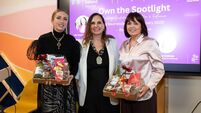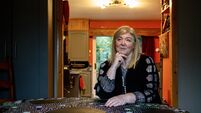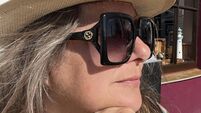Cork graduate launches ‘one-stop sex positive guide’

Sex and relationships educator and author Grace Alice O’Shea
SEX and relationships educator and author Grace Alice O’Shea reports that when most people finish her latest book – written for students, parents, and teachers – they’re struck by its kindness.
This is very much her intention.
“People forget that sex and relationships should be rooted in empathy, inclusivity, and respect. It’s always about being kind to one another and that relates to everything else in our lives. This book is not only about labelling body parts, but about exploring identity and building connection.”
ABOUT THE AUTHOR
Grace originally trained as an Occupational Therapist at University College Cork, before completing her Masters in Health Promotion at NUI Galway. She is now finding her way back to Occupational Therapy and in the process of registering as an OT specialist in sex and intimacy.
She is clearly very passionate about her subject.
“My work is about empathy and kindness. It’s not about finding a label and sticking to it. It’s about knowing that we are all in a state of change and flux throughout our lives.
"The thing is, you don’t need to understand someone to respect them. It’s OK not to understand everything. If we allow ourselves the freedom to not fully understand, we don’t let fear and hatred in, we don’t let them take hold.”
The book, Sex Educated, is a one-stop sex positive, inclusive and comprehensive guide to all things sex, intimacy and relationships for teens and young adults. It’s also perfect as a guide for anyone who has young people in their lives - parents and teachers, for instance - and would like to feel more comfortable and informed around these important topics (that can also be complicated, awkward and sensitive).
Commissioned by Galway-based charity Sexual Health West, the concept of the book arose organically for O’Shea in her work with schools.
“I worked with Sexual Health West for a few years, delivering workshops to teenagers, and it dawned on me that nobody else was getting so much on the ground experience of what these young people were experiencing.
"At the end of every session, I’d ask for anonymous questions and these would steer my delivery of the second session, third session, and so on.
"The students’ questions shaped my delivery and let me know what I needed to concentrate on in different contexts.”
These questions also determined the shape of the book. The author describes it as an index of their questions and her answers, separated by theme.
“I was led by the students’ questions. I simply organised them into different themes to make them digestible and accessible. But the great thing about this book is that it tells you exactly what Irish teenagers are thinking, experiencing, and wondering about. Often, we can think they’re either up to everything or they’re up to nothing. Assuming can be damaging; this book gives you a grounding in their lived experiences.”
FILLING A VOID
O’Shea was also struck by the needs of parents and educators.
“It can be overwhelming for people. There were a lot of parents asking for help, reporting the lack of Irish resources for Irish teenagers. Parents wanted resources that reflected the culture being experienced by their children.”
Edited by five other educators, thereby gathering decades of experience, the book was written to fill this void.
“There is so much out there online, so many different resources, that it’s hard for parents and teachers to separate the good information from the misinformation.
"Many parents and teachers didn’t receive sex and relationship education so it’s difficult for them, and teachers often lack the support and professional development they need to do it confidently.”
The author is very mindful of how the resource will work for different people in a very practical way.
“I had different families in my mind when I wrote the book. So, let’s say you’re a single dad who is raising a daughter. Well, then you might go straight to the section on periods, how to talk about them, how to support your child through the experience of the first period and beyond.”
O’Shea is very keen to support parents and urges them to be kind to themselves too.
“It’s important that parents don’t obsess about being perfect and getting everything right. They just need to be open to learning, and they need to provide a safe space for children to ask questions. They might not know the answer. I’m an expert in the field and I’m learning all the time. It’s constantly being updated and I’m always changing how I phrase things in my work.”
As a parent myself, I ask her if good enough is OK.
“Good enough is amazing!” she beams back at me. “What’s important is that you have lots of small talks and moments with your child, not just one big talk.
“You can also model for your child by avoiding any kind of body shaming, by being kind to yourself too.”
WORK TO DO
Grace Alice O’Shea assures me that her experiences in schools are generally positive. This is especially the case if there is one member of staff who is really committed to providing the best sex and relationship education to students.
“If you have someone like that in the school, it is very powerful. Usually, it’s an SPHE teacher or a TY co-ordinator. Sadly, in some schools it feels more like a tick-box exercise. It should never be that. This is a very specialised area and a blended approach is best for young people. It’s important to have people like me visit because students know they will never see me again. Nothing embarrasses me. They can ask me anything!
“But my visit is not enough on its own. The same messages need to be reinforced throughout the students’ time in schools. It must be multi-layered.”
The author reports varied attitudes among students also.
“We might demonise social media, but it educates young people too and a lot of young people seem quicker now to call out misogyny, homophobia, and transphobia. But those attitudes are absolutely out there, and we need to keep working at it.
“We need to do more work on what it feels like to be socialised as a boy, a man. We need to normalise human feelings and emotions and support young people in processing and expressing them, so that these feelings do not build up and cause harm to themselves and those around them.”
O’Shea wishes there were more men in her profession.
“This is very much a female- dominated space and I often think when I’m doing a workshop for a class of boys, let’s say, this would be better coming from a man, as they might relate to him more.”
And there are other pressing concerns for O’Shea.
“The BeLonGTo report (who support LGBTI students) that came out a few years ago shows us that we have work to do. It took us a long time to get our heads around sexuality, but gender identity is a whole new thing for some people and the negative discourse around it can be toxic.
“I hear young people using language sometimes and I know they’ve heard it at home. We need to keep coming back to feeling comfortable with what we might not fully understand. I only know what it’s like to be Grace, but every person I come across is worthy of respect, solely because they are a human being.”
Sex Educated is available to order now from https://sexualhealthwest.ie/product/sex-educated-by-grace-alice-oshea/
More in this section







 App?
App?


